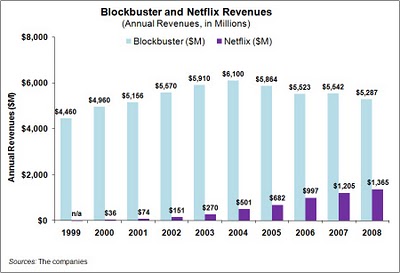Where does Blockbuster go from here?
 Today's Dallas Morning News has a good article about Blockbuster's attempts to move deeper into digital distribution. The company is trying numerous ways to move beyond the traditional retail-oriented DVD and Blu-ray rental model, and the article mentions several initiatives, including:
Today's Dallas Morning News has a good article about Blockbuster's attempts to move deeper into digital distribution. The company is trying numerous ways to move beyond the traditional retail-oriented DVD and Blu-ray rental model, and the article mentions several initiatives, including:
* Mailing DVDs/Blu-ray Discs to customers who can't find the titles on store shelves (and they don't have to sign up for the mail-order service);
* The ability to rent or download current releases from BLOCKBUSTER On Demand, which is a key difference between its service and the Netflix service;
* Deploying unique features that allow an iPhone user to rent a movie on the phone and have it waiting for them at home on their Samsung connected TV;
* Working with Motorola to create a movie-viewing app for an upcoming handset; and
* Testing kiosks where content can be downloaded to memory cards.
All of these options are important for Blockbuster to inject some life into its struggling retail business. My view is that the Blockbuster we see in a few years (assuming we still see it) will look very different from the retail-oriented presence it has today. Blockbuster may have to actually have to shift as a backend supplier of content and technology services to entities such as telecom service providers that may not offer full-blown IPTV services but who want to offer VoD services to their customers. You see this happening already in Europe with companies such as SF Anytime, which began as an online video provider but that now offers it to some Nordic telecom operators.
The work with Motorola is intriguing too, because Europe also has examples of online VoD companies that are working with handset developers and consumer electronics companies to offer movies and other video content. Acetrax is a good example of one such company, as it is working with Samsung.
Perhaps Blockbuster should take its cue from a company such as CinemaNow, which struggled in the early days to gain traction as a PC-only video-on-demand service. Now, the company is working more as a backend supplier for not only Blockbuster and its streaming initiatives, but also Best Buy, zip.ca (the "Netflix of Canada"), Cineplex (a large movie theater chain in Canada), and Hollywood studios such as Warner Bros. and Lionsgate. Over the past couple of years, Roxio CinemaNow has begun working with a growing list of consumer electronics companies (and CE technology suppliers) such as Entone, Funai, NVIDIA, Lenovo, and Toshiba.
One key difference between Blockbuster and the other companies mentioned in this blog is that Blockbuster's new opportunities - taken separately - will certainly be smaller than the $6 billion in revenues that it once enjoyed. However, a smaller Blockbuster could be a more nimble company, able to more adeptly respond to new market opportunities and truly gain a toehold in emerging areas of digital distribution.
Next: Technicolor (formerly Thomson) supporting ONO with residential gateways
Previous: Ziggo unveils technical support services
Comments
-
Be the first to leave a comment.
Post a Comment
Have a comment? Login or create an account to start a discussion.


